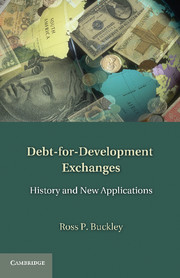Book contents
- Frontmatter
- Contents
- Acknowledgments
- List of Contributors
- Introduction: A Productive Partnership between Civil Society and the Academy
- Part I Types of Exchanges and Their Development over Time
- Part II Exchanges by Donor Countries
- Part III Critiques of Exchanges
- Part IV Innovative Applications of Exchanges
- Conclusion
- Index
Conclusion
Published online by Cambridge University Press: 01 June 2011
- Frontmatter
- Contents
- Acknowledgments
- List of Contributors
- Introduction: A Productive Partnership between Civil Society and the Academy
- Part I Types of Exchanges and Their Development over Time
- Part II Exchanges by Donor Countries
- Part III Critiques of Exchanges
- Part IV Innovative Applications of Exchanges
- Conclusion
- Index
Summary
Debt-for-development exchanges have much to offer developing countries and donor countries that wish to promote debt cancellation and/or aid budgets.
PRINCIPAL ADVANTAGES OF DEBT-FOR-DEVELOPMENT EXCHANGES
This financial technique has at least five benefits:
1. Debt-for-development exchanges provide funding for much needed development projects.
2. Debt-for-development exchanges promote debt reduction. Debt reduction is critical for many developing countries. In 2005, the G8 nations resolved that the International Monetary Fund (IMF), the concessional lending arm of the World Bank, and the African Development Bank should cancel all of their debts to poor countries that comply with the requirements of the World Bank's debt-relief program, the Highly Indebted Poor Countries (HIPC) Initiative. This became known as the MDRI, the Multilateral Debt Reduction Initiative. This total cancellation of debt will certainly assist those nations that receive it, but only 24 nations currently qualify for such total debt cancellation, and only a further 17 can potentially become eligible in the future.
Yet many nations not poor enough to qualify for such relief labour under stultifying debt overhangs. For instance, in 2007 Indonesia's total external debt stood at US$137.4 billion, which was 31.7% of GDP and represented 104.5% of total exports. In 2008 the Philippines' total external debt was US$53.5 billion, which represented 33.4% of GDP. Debt-for-development exchanges offer debt relief to debt-constrained nations such as these and many others that are not eligible for relief under HIPC initiatives.
- Type
- Chapter
- Information
- Debt-for-Development ExchangesHistory and New Applications, pp. 316 - 322Publisher: Cambridge University PressPrint publication year: 2011



